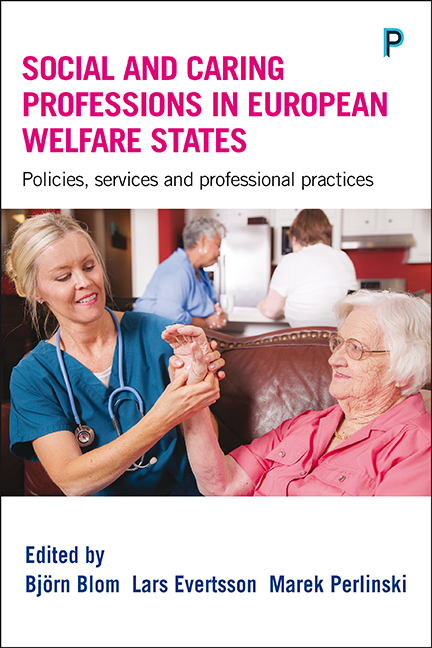 Social and Caring Professions in European Welfare States
Social and Caring Professions in European Welfare States Book contents
- Frontmatter
- Contents
- List of tables and figures
- Notes on contributors
- Preface
- one European social and caring professions in transition
- Part 1 Knowledge, reflection and identity in the social and caring welfare professions
- Part 2 Control, regulation and management
- Part 3 Collaboration, conflict and competition
- Part 4 Assessment, negotiation and decision making
- Index
eleven - Professional dilemmas of defining a problem: the case of addiction treatment
Published online by Cambridge University Press: 05 April 2022
- Frontmatter
- Contents
- List of tables and figures
- Notes on contributors
- Preface
- one European social and caring professions in transition
- Part 1 Knowledge, reflection and identity in the social and caring welfare professions
- Part 2 Control, regulation and management
- Part 3 Collaboration, conflict and competition
- Part 4 Assessment, negotiation and decision making
- Index
Summary
Introduction
Let us start this chapter with a question: if you had a drug problem, to which profession would you go to seek help? If we think about this question for a couple of seconds, it seems naive, almost provocative in its simplicity. If we live in a welfare state, this is one of the things we should know, and if we do not, we should be able to find out without much effort. However, we do think that this question has to be raised in order to problematise other basic sociological questions, namely: where does the drug problem belong? Which profession is best suited to help people with drug problems?
As we all know, how we as a society view and define a problem is not self-evident, and depends on a number of factors. As a starting point, we can use some of the thoughts formulated by Berger and Luckmann (1966), namely that:
• Reality is something we construct together through social interaction.
• What we see as knowledge is an object for the sociology of knowledge.
• Different professions are defined and ‘guarded’ by different mechanisms where knowledge plays a crucial part.
To expand on the latter point, and in the words of Berger and Luckman (1966, p 105):
Meanwhile the fully accredited inhabitants of the medical world are kept from ‘quackery’ … not only by the powerful external controls available to the profession, but by a whole body of professional knowledge that offers them ‘scientific proof ‘ of the folly and even wickedness of such deviance. In other words, an entire legitimating machinery is at work so that laymen will remain laymen, and doctors doctors….
This example concerns physicians, and serves well as an introduction to this chapter, in which we discuss two different professions, namely ‘physicians’, as representatives of medical science, and ‘social workers’ as representatives of social sciences. Addiction and addiction treatment is an interesting case since physicians work together with other professions in a way that is not evident in other areas. For instance, we have a hard time imagining a patient with a broken bone going to social services, or someone who has just been evicted as being primarily in need of a doctor's appointment.
- Type
- Chapter
- Information
- Social and Caring Professions in European Welfare StatesPolicies, Services and Professional Practices, pp. 161 - 174Publisher: Bristol University PressPrint publication year: 2017
- 1
- Cited by


